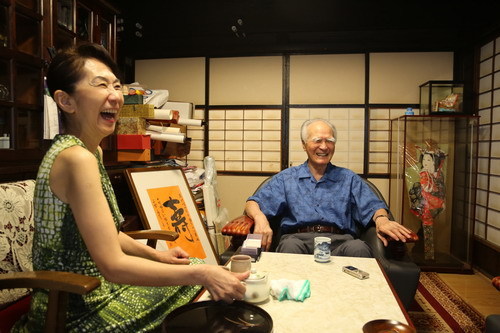Ex-Japanese PM: Abe should not visit Yasukuni Shrine
By Cai Hong (chinadaily.com.cn) Updated: 2014-08-13 15:18
|
|
| Former Japanese Prime Minister Tomiichi Murayama poses for a photo with his daughter. |
Q: Do you think Japan needs to build another venue that is free of controversy?
A: We had such an idea of building a new memorial, which has nothing to do with religion, for those who died for their country. Yasukuni has enshrined ordinary soldiers along with the Class A war criminals. Some people recommend that it no longer should enshrine war criminals. There were also other proposals but none remains feasible. So I think the best solution is that prime ministers and Cabinet members shun the shrine.
Abe's Cabinet has decided to allow Japan the right to collective self-defense. What implications do you think this will have on Japan's relations with its neighbors?
Japan's Constitution renounces the right to wage war. The postwar administrations prior to the Abe Cabinet followed this. Since taking office in December 2012, Abe has tried to revise the interpretation of the Constitution. His approach is unconstitutional.
The Abe administration has exaggerated the dangers Japan is faced with. Japan should figure out how to clear up the factors that Abe takes as the justifications for collective self-defense rather than exercising the right.
Q: How do you respond to the co-existence of China, Japan and the Republic of Korea (ROK)?
A: There is a bright future ahead for further development in northeast Asia in the coming decades. Therefore, China, Japan and the ROK should deepen their multilateral cooperation and work to jointly safeguard peace and security in Asia. I have similar aspirations for all people concerned with peaceful growth in the region.
I believe China will agree with me. I have made many visits to the country, Chinese leaders vow to stick to peaceful development and never seek hegemony. Therefore, both China and Japan should deepen their mutual trust and promote further cooperation in many fields, which is critical for the maintenance of peace and security in northeast Asia. More questions are to be answered when it comes to the future of the region.












